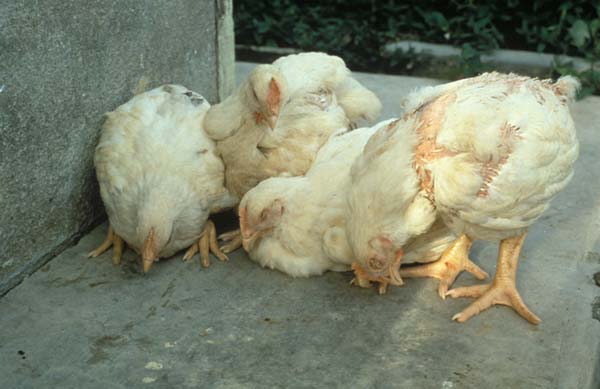Newcastle Disease
Newcastle Disease
Newcastle Disease is a highly contagious viral infection that affects many species of domestic and wild birds to varying degrees. Domestic fowl, turkeys, pigeons and parrots are most susceptible while a mild form of the disease affects ducks, geese, pheasants, quail and guinea fowl. The disease can result in digestive, respiratory and/or nervous clinical signs, which range from a mild, almost inapparent respiratory disease to very severe depression, drop in egg production, increased respiration, profuse diarrhoea followed by collapse, or long-term nervous signs (such as twisted necks) if the birds survive. Severe forms of the disease are highly fatal.

Signs of ND - conjunctivitis, depression and neurological signs Source: CSIRO
What causes Newcastle Disease?
Newcastle Disease is caused by a paramyxovirus that can vary in pathogenicity from mild to highly pathogenic. Spread is usually by direct physical contact with infected or diseased birds. The virus is present in manure and is breathed out into the air. Other sources of infection are contaminated equipment, carcasses, water, food and clothing. People can easily carry the virus from one shed or farm to another. Newcastle Disease virus does not affect humans in the same way that it does birds but it can cause conjunctivitis in humans.
Prevention and treatment of Newcastle Disease
There is no treatment for Newcastle Disease, although treatment with antibiotics to control secondary infections may assist. The virus can remain alive in manure for up to 2 months and in dead carcasses for up to 12 months, however, it is easily killed by disinfectants, fumigants and direct sunlight. Prevention relies on good quarantine and biosecurity procedures and vaccination. Newcastle Disease vaccination of commercial meat and egg layer chickens has been made compulsory in many Australian States. For information on compulsory Newcastle Disease vaccination in your State contact your State department of primary industries or agriculture. Further information on the national situation in regard to Newcastle Disease can be found at The Animal Health Australia website.

